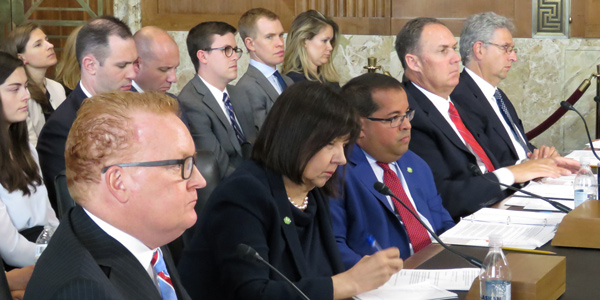By Rich Heidorn Jr.
WASHINGTON — A year ago, the electricity policy-sphere was on pins and needles over how FERC and its new Chairman Kevin McIntyre would respond to the Trump administration’s bid to bail out coal and nuclear generators.
McIntyre won plaudits in January when he led a 5-0 vote rejecting the Department of Energy’s Notice of Proposed Rulemaking and instituting a new resilience docket (AD18-7).
FERC begins 2019 with a new chairman and renewed questions about whether it will resist the president’s efforts to deliver on his campaign pledges to coal country.
Republican Bernard McNamee — who helped author the DOE NOPR and who has complained that renewables are disruptive to “the physics of the grid” — was sworn in as commissioner after winning Senate confirmation on a 50-49 party-line vote. At his first open meeting, days before Christmas, McNamee was greeted by protests and questions over whether he would recuse himself from the resilience debate.
In two rounds of filings in the new docket, RTO officials and other commenters generally agreed that FERC should let stakeholder processes work and not issue broad and costly new mandates. The commission has given no indication how soon it will rule or what it will do with the information.
McIntyre gave up the chairmanship in October after revealing that he had suffered a “serious setback” in his battle with a brain tumor. The chairman’s health had become the subject of increasing speculation since a fall that left him visibly uncomfortable at the July open meeting, the last he attended. Although he remains on the commission, he is unable to come to FERC headquarters and is not participating in any decisions.
Pipeline Inquiry, Storage Rule, ROE
Before relinquishing the chairmanship, McIntyre and the commission approved several important rulemakings. In January, McIntyre announced the commission would open a Notice of Inquiry to consider changes to its 1999 policy statement on the permitting of natural gas pipelines, drawing praise from Democratic Commissioner Cheryl LaFleur (PL18-1).
In May, however, the commission’s Republican majority narrowed the circumstances under which FERC will estimate greenhouse gas emissions from natural gas pipeline projects, sparking dissents by LaFleur and Democrat Richard Glick, who said the decision effectively eliminates any consideration of GHG emissions associated with a project (CP14-497-001).
In February, the commission also approved Order 841, which required regional grid operators to remove barriers to electric storage in their capacity, energy and ancillary services markets. Dylan Reed, head of congressional affairs for Advanced Energy Economy, said the compliance filings by grid operators in December “could lead to a minimum of 7 GW of storage deployment in the RTO markets and potentially could lead to 50 GW across the country. For scale, the rule’s impact is essentially the equivalent of 86% of all installed solar capacity to date,” Reed said during AEE’s year-end webinar. “So, this really is a monumental rule.”
The commission’s NOPR had also proposed giving aggregated distributed energy resources the same treatment as storage, but the panel concluded it needed more information before it could act, ordering a technical conference and new dockets for the issue (RM18-9, AD18-10).
In April, the commission revised its pro forma large generator interconnection procedures and large generator interconnection agreement (LGIA) to increase the transparency and timeliness of the interconnection process (RM17-8). The rulemaking, which was prompted by a complaint by the American Wind Energy Association, applies to generators larger than 20 MW.
Days before McIntyre gave up the gavel, the commission issued its response to the D.C. Circuit Court of Appeals’ 2017 ruling vacating FERC’s 2014 order on calculating return on equity rates. The commission said it would no longer rely solely on the discounted cash flow (DCF) model it has used since the 1980s; instead, it said it will give equal weight to results from the DCF and three other metrics, a change likely to result in higher ROEs (EL11-66-001, et al.).
McIntyre also navigated two controversies in his brief chairmanship. The first came when Commissioner Neil Chatterjee disclosed in January that former FERC General Counsel Bill Scherman had improperly contacted him “indicating his concern that the commission would shortly issue an order adverse to the interests of” his client, FirstEnergy. At a press conference, McIntyre declined to say whether the commission would investigate the ex parte communication by Scherman, whom he called a “good friend.”
Later, McIntyre came to the defense of Chief of Staff Anthony Pugliese, who came under fire for partisan comments at a speech and in an interview with right-wing media outlet Breitbart.
Chairman Chatterjee’s Return
Chatterjee, who had held the chairmanship on an acting basis for more than four months in 2017, was appointed McIntyre’s replacement Oct. 24. Chatterjee said his priorities as chairman will be grid resilience and reliability, cybersecurity, processing LNG facility applications and eliminating barriers to entry for new technology.
A former energy adviser to coal state Senate Majority Leader Mitch McConnell (R-Ky.), Chatterjee praised McIntyre for helping him understand “that politics could not be allowed to interfere with the work of the commission,” advice he said aided his transition “from formerly partisan legislative aide to independent regulator.”
After the commission’s Dec. 20 meeting, Chatterjee told reporters he was confident that McNamee would similarly transition from a fuel-wars partisan to an impartial adjudicator. “So, all I would ask is that he be given an opportunity to demonstrate that, like myself, [McNamee] will be an earnest public servant.”
Chatterjee comes in with numerous pieces of unfinished business, including the pipeline policy review and the rulemaking on DERs.
With the arrival of McNamee, “it’s unclear where [the DER ruling] is going to go in 2019,” said AEE’s Reed. “Fortunately, we do know that Chairman Chatterjee is committed to innovation and removing barriers to technologies as he’s now said in numerous public speeches over the last few months.”









